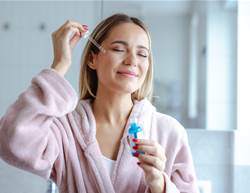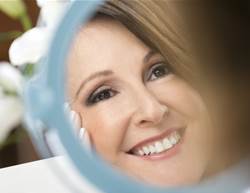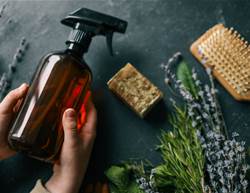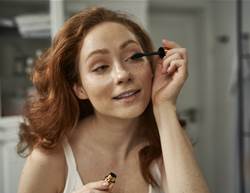Head to the beauty aisle at any pharmacy around the country and you can be sure that the dazzling declarations displayed on the shelves will be overwhelming. “Pick me,” purrs the night cream, which promises to turn back time while you sleep. “I’m over here,” calls the serum, jostling for space between the oil and the eye balm which guarantees instant youth.
Of course, when using your favourite products, there’s plenty of anecdotal evidence that they do the job you’ve paid for them to do (from the moisturiser that gives your skin a hydrated plumpness, to the ointment that appears to dissolve fi ne lines before your eyes – though the way your eyes crinkle when you smile is beauty personified). Still, science is a pedantic creature that doesn’t ‘do’ anecdotal.
If you want to get your mitts on products proven to diminish the visible signs of ageing, keep a look out for these ingredients. Consider them your personal team of anti-ageing superstars, backed by scientific research.
1. Retinoids: the skin-cell regulators
Retinoids are derived from vitamin A, along with their close relatives, retinol, retinaldehyde and tretinoin (try saying that without getting tongue-tied). According to Dr Karen Koh from the Australasian College of Dermatologists, retinoids (and family) diminish the signs of ageing, especially sun-related or photo-ageing, by promoting collagen production (which is damaged by UV radiation from the sun), as well as slowing collagen degradation.
“Tretinoin is able to reduce the signs of early skin ageing, reducing fine wrinkles, improving skin elasticity and helping even out pigmentation,” Dr Koh says, “though retinol is the most often-used retinoid for anti-ageing and, compared with tretinoin, is less irritating to the skin.”
A study published in the Journal of Cosmetic Dermatology, found that 12 weeks of applying topical retinol resulted in fewer facial wrinkles and a significant impact on both the cellular and molecular properties for the epidermis and the dermis. Put it on at night, feel fresh-faced by morning.
Try: Paula’s Choice Clinical 0.3% Retinol + 2% Bakuchiol. Studies show that retinol and bakuchiol (a plant-based retinol alternative) work more effectively together and this serum contains both, which, along with peptides, help stimulate collagen, boost cell turnover and smooth lines.
“Most clinical prescriptions of retinol are 0.05%, so 0.3% retinol is quite potent,” says Dr Yiasemides, Prevention Best of Beauty Awards 2021 expert.
2. Peptides: the collagen boosters
What’s not to love about peptides? These short chains of amino acids have the ability to imitate the building blocks of skin – that is, proteins like collagen, elastin and keratin.
“Some peptides have been shown to stimulate collagen synthesis and they can also assist in preventing or treating fine wrinkles,” Dr Koh says. New peptides are constantly being developed by scientists, as understanding of the skin – and use of peptides in cosmeceuticals – grows.
According to a German study from 2017, there is a wide range of biologically active peptides and peptide sequences that can specifically target the the cosmetically important skin layers.
“Twenty years ago, no scientist ever thought that the development of synthetic or natural-related peptides for cosmetic purposes would be so effective,” says study author Silke Karin Schagen. All hail the power of peptides.
Try: No 7 Laboratories Line Correcting Booster Serum. This highly anticipated new arrival on Aussie shores really does live up to the hype. The booster serum, which plumps the skin and effectively stimulates collagen, is clinically proven to soften lines and wrinkles in as little as one week.

3. Antioxidants: the anti-ageing superheroes
A mainstay of superfoods the world over, from blueberries and dark chocolate to cranberries and walnuts, antioxidants are supplied mainly through our diet.
The word ‘antioxidants’ is a collective term for substances that help to neutralise the harm inflicted on our skin by the sun’s UV rays, which cause damage to collagen and elastin fibres. In skincare, Dr Koh says, vitamin C, B3 and E are the most important antioxidants because they have small enough molecules to penetrate the skin from a cream.
“Vitamin C, in concentrations of 5-15%, increases production of certain collagens. This can be enhanced in combination with vitamin E,” she says. “Vitamin B3 [also known as niacinamide] regulates cell metabolism and regeneration, and at 5% concentration can improve elasticity and redness, and even out pigmentation. Vitamin E, in concentrations of 2-20%, can assist with smoothing skin, though its effects are not as strong as vitamins C or B3.”
One study found that when used in combination with daily sunscreen and retinoids, antioxidants further enhanced the protective effects against wrinkle formation.
Try: Dr LeWinn’s Line Smoothing Complex High Potency Sheet Mask. Give your face a replenishing treatment with this potent mask, full of peptides, antioxidants, collagen and hyaluronic acid to smooth and hydrate your skin while softening lines and wrinkles. Simple to use, the hydrogel mask is moulded to fit your face like a second skin.
4. Hydroxy acids: exfoliators extraordinaire
Meet alpha and beta (commonly known as AHA and BHA respectively). Also called fruit acids, AHAs and BHAs have excellent exfoliation properties and clinical trials have shown that both of these ingredients are effective for reversing the effects of photo-ageing and improving wrinkles, skin elasticity, tone and hydration.
“AHAs and BHAs stimulate exfoliation of the cells from the top layers of the skin, but also increase skin regeneration and hydration,” Dr Koh says. In the AHA hall of fame, one of the most well-known fruit acids is glycolic acid. For BHAs, it’s salicylic acid.
“Used frequently in acne products, salicylic acid dries out pimples,” explains Dr Koh. “It is less irritating on the skin compared with AHAs and is helpful for people with oily skin and blackheads.”
AHAs are water-soluble (and enhance natural moisturisation), so work better for dry and sun-damaged skin, while BHAs are oil-soluble, best for blemished skin and pores. A word of warning, though: these smart acids can increase the skin’s sensitivity to the sun, so slathering on sunscreen in the daylight hours is essential.
Try: Glo Skin Beauty Hydra-Bright AHA Cleanser. Formulated with blue lotus, lactic acid and carnosine to purify, hydrate and brighten skin, this exceptional cleanser is both exfoliating and hydrating – an excellent combination that leaves your skin feeling soft and smooth.
“AHA cleansers are very good for oilier skin types,” says Dr Yiasemides.
5. Hyaluronic acid: the extreme moisturiser
It’s a dry-as-a-desert fact of life that ageing causes the skin to lose moisture. Enter hyaluronic acid. It’s the key molecule involved in skin hydration and has a unique capacity for retaining water.
In skincare, it also has the potential to have a positive effect on not only boosting hydration but also reducing the appearance of lines and wrinkles. A German study that examined the effects of hyaluronic acid antiwrinkle creams found that after three months of using the creams (many of which were popular brands), the depth of perioral and orbital wrinkles decreased significantly in all study participants, with depth reduction ranging between 10-20%. Skin tightness increased significantly in all groups, rising by 13-30%.
Regular use of hyaluronic acid on the skin showed “clear and positive effects on wrinkle depth and skin tightness”. It’s no secret that the skin loves a drink, and hyaluronic acid quenches its thirst with the beauty of an oasis in the Sahara.
Try: PCA Skin Hyaluronic Acid Boosting Serum. A potent hyaluronic acid serum that boosts hydration both on and beneath the surface of your skin. Containing niacinamide (to improve skin defences and help clear the skin) and ceramides (to soften and support the skin’s protective layer), it sinks in instantly and feels silky smooth.










